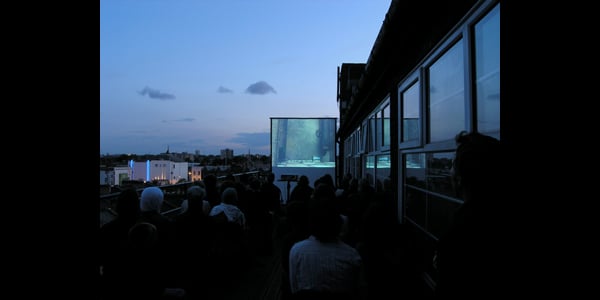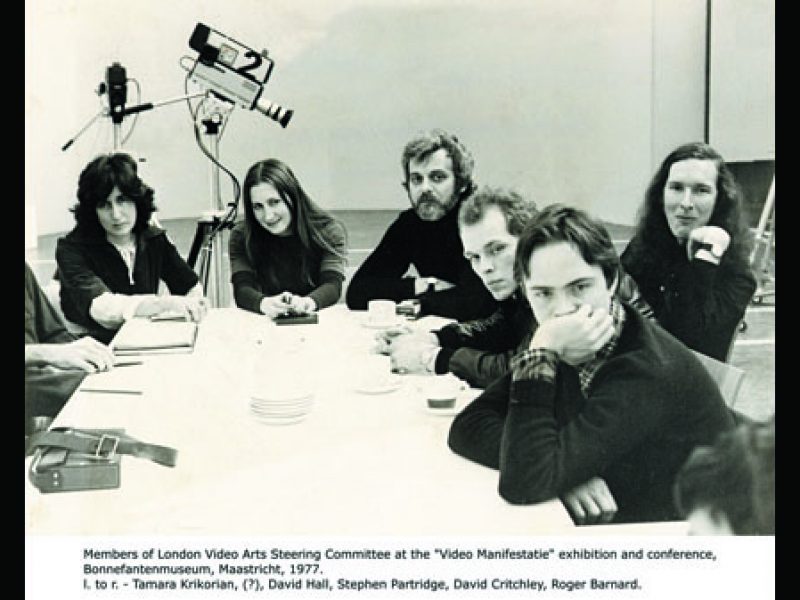A unique Research Masters degree devoted to the study of Artists Moving Image
Over the past two decades, artists moving image has proved itself a dynamic and thriving area of art practice, to be encountered in the gallery, museum, cinema auditorium, and a host of other unexpected venues. But what about the rich and fascinating histories, theories and aesthetics that have led artists to turn to film and video? And what insights can a study of artists moving image offer us for understanding the diverse practices that now fill art spaces internationally as well as in the UK?
A unique association between LUX and Central St Martins College of Art has created a research led masters degree to address these questions. The course is focused on nurturing a discursive culture around moving image art, and offers a number of unique features for students interested in studying and working in the field of artist’s moving image.
As the only course of its kind dedicated solely to the study of artist filmmaking, the pathway offers an in depth insight and understanding into the theories, aesthetics and histories that have contributed to its rich and diverse culture and filmmaking practices. Seminars are led by eminent scholars in the field: including Erika Balsom, Maeve Connolly, Rachel Moore, Uriel Orlow, Filipa Ramos, Maria Palacios Cruz and Duncan White. Visiting lecturers have included James Boaden, Rachel Garfield, Ros Gray, Adam Pugh, Jonathan Walley, Federico Windhausen and Dr Maxa Zoller, as well as Ben Cook and Matt Carter from LUX.
Seminars and lectures are supported by screenings of rare and important film and video works from the LUX’s unique collection, and the rich archive of artist material held at the British Artists’ Film and Video Study Collection at St Martins. Students interested in a career in this growing area of artists creative practice will also benefit from access to the professional networks and opportunities offered by the contacts and resources at LUX and St Martins.
MRes Art: Moving Image leads scholarship and develops new discourses in one of the fastest growing visual arts contexts: artists’ moving image. The course is founded on strong links with LUX, the key UK agency supporting practice in this field.
Reasons to Apply
MRes Art: Moving Image enables you to pursue your studies whilst also undertaking part-time employment, internships or care responsibilities. You are expected to commit 30 hours per week to your studies; your taught input will normally be scheduled over a maximum of two to three days per week during term time. Central Saint Martins was one of the first educational establishments to recognise the importance of the moving image as an art medium and continues to lead scholarship through its academic activities and related archives, such as the Moving Image Forum and the unique resource of the British Artists Film and Video Study Collection. MRes Art: Moving Image offers the opportunity of acquiring unique insight and depth into the subject of artists moving image culture, through lectures, seminars and screenings with acknowledged scholars, artists and specialists in the field. Please see the staff profiles on the CSM website.
You’ll benefit from our strong link with LUX, a key UK agency (based in London) for the support and promotion of artists’ moving image practice, where you’ll have unique access to the professional working context of LUX as well as its large network of collaborating national and international institutions, artists and key arts professionals working with the moving image.
You’ll have excellent access to the UK’s only significant collection of artists’ film and video works and the largest such collection in Europe, held by LUX, and use of the British Artists Film and Video Study Collection held at CSM.
You’ll be well placed to pursue a range of careers in artists’ moving image culture. You may opt for academic scholarship through doctoral research or choose to continue in professions within curating and film programming, distribution, publishing and journalism. For some graduates the course will enrich their own practice as artists working with moving image.
Alumni Reflections on the MRES
‘What initially attracted me to the course was its very specific focus and blending of disciplinary boundaries between the histories of art and film. The course offered great professional development experiences and opportunities: preparing and organising a symposium for the inaugural LUX/ICA Biennial of Moving Images in 2012; and collaboratively developing the curatorial framework for Inner/Outer [Space] a public screening and performance programme and online exhibition.The flexibility of the second year self-directed Independent Research Project allowed me to focus my research around a series of interview-based case studies exploring publishing of artists’ film and video. The extended engagement with the independent project opened up a rich vein of research that I am still investigating through conference papers and articles as well as in practice in my job sourcing artists’ books and DVDs for the BFI Shop.’ – Elizabeth Frey
‘A long standing interest in and a later practice in moving image, led me to progress from a background in electronic music composition and sound arts. I was excited to learn about this kind of moving image that so interested and inspired me, and also to explore my critical writing and research interests, with a desire to inform my own video art projects, and also a route into academia. I am now continuing my video art, audiovisual experimentation, and also embracing documentary-influenced filmmaking. The course split between Lux and CSM was fertile ground for some very different learning contexts and something very unique also. The depths between written theory and moving image spectacle, converged over the course of the program, equipping us with research techniques and importantly knowledge of an under represented field of the arts.’ – Andrew Locke
‘The two years of Mres studies were very stimulating both intellectually and artistically.I would encourage anyone with an interest in artist moving image to pursue the Mres course. We got a strong knowledge of the field’s history and theory from the first experiments with filmmaking to today’s practices and a deep understanding of the complex issues surrounding moving image practices, in terms of politics, ethics, distribution and diffusion. As a growing field in the arts, this course is a great opportunity to learn and to research thoroughly a personal field of interest. Alongside the theoretical engagement, the course also emphasize on curating development, notably with LUX, which gave us all a great professional experience. Since the end of the Mres, I curate moving image programmes at the ICA as part of the ICA Forum and I have started a Moving Image Festival in Paris. In parallel I work on my own filmmaking practice. The Mres course has pushed forward my understanding of curating and my own artistic practice. It’s a great course!’ – Tabita Rezaire
For more information and to apply see the CSM website or email Course Leader Dr Lucy Reynolds at [email protected]




